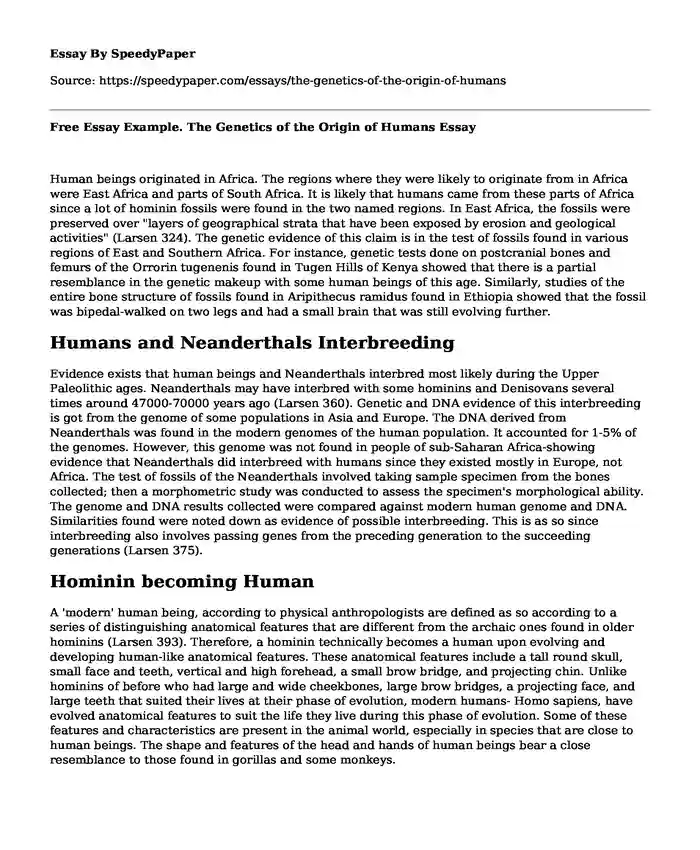
| Type of paper: | Essay |
| Categories: | Data analysis Anthropology Genetics Human |
| Pages: | 3 |
| Wordcount: | 660 words |
Human beings originated in Africa. The regions where they were likely to originate from in Africa were East Africa and parts of South Africa. It is likely that humans came from these parts of Africa since a lot of hominin fossils were found in the two named regions. In East Africa, the fossils were preserved over "layers of geographical strata that have been exposed by erosion and geological activities" (Larsen 324). The genetic evidence of this claim is in the test of fossils found in various regions of East and Southern Africa. For instance, genetic tests done on postcranial bones and femurs of the Orrorin tugenenis found in Tugen Hills of Kenya showed that there is a partial resemblance in the genetic makeup with some human beings of this age. Similarly, studies of the entire bone structure of fossils found in Aripithecus ramidus found in Ethiopia showed that the fossil was bipedal-walked on two legs and had a small brain that was still evolving further.
Humans and Neanderthals Interbreeding
Evidence exists that human beings and Neanderthals interbred most likely during the Upper Paleolithic ages. Neanderthals may have interbred with some hominins and Denisovans several times around 47000-70000 years ago (Larsen 360). Genetic and DNA evidence of this interbreeding is got from the genome of some populations in Asia and Europe. The DNA derived from Neanderthals was found in the modern genomes of the human population. It accounted for 1-5% of the genomes. However, this genome was not found in people of sub-Saharan Africa-showing evidence that Neanderthals did interbreed with humans since they existed mostly in Europe, not Africa. The test of fossils of the Neanderthals involved taking sample specimen from the bones collected; then a morphometric study was conducted to assess the specimen's morphological ability. The genome and DNA results collected were compared against modern human genome and DNA. Similarities found were noted down as evidence of possible interbreeding. This is as so since interbreeding also involves passing genes from the preceding generation to the succeeding generations (Larsen 375).
Hominin becoming Human
A 'modern' human being, according to physical anthropologists are defined as so according to a series of distinguishing anatomical features that are different from the archaic ones found in older hominins (Larsen 393). Therefore, a hominin technically becomes a human upon evolving and developing human-like anatomical features. These anatomical features include a tall round skull, small face and teeth, vertical and high forehead, a small brow bridge, and projecting chin. Unlike hominins of before who had large and wide cheekbones, large brow bridges, a projecting face, and large teeth that suited their lives at their phase of evolution, modern humans- Homo sapiens, have evolved anatomical features to suit the life they live during this phase of evolution. Some of these features and characteristics are present in the animal world, especially in species that are close to human beings. The shape and features of the head and hands of human beings bear a close resemblance to those found in gorillas and some monkeys.
From the Film and Books
The film and the chapters in the book have the common basis of human evolution. From the film, one can get to know how the human being has evolved and spread across the continent at almost the same time. Through DNA and genome research and analysis, similarities can be found between the Homo sapiens that was found originated in East Africa and several others across Africa, and the human being that exists now. In conclusion, there is a possibility that human ancestors in the evolution hierarchy interbreed and spread globally and thus the great diversity in the human species.
Works Cited
Larsen, Clark Spencer. "Chapter 10: Early Hominin Origins and Evolution: The Roots of Humanity." Larsen, Clark Spencer. Our Origins: Discovering Physical Anthropology. Massachusetts: W.W. Norton & Company, 2017. 309-353.
Larsen, Clark Spencer. "Chapter 11: The Origins and Evolution of Early Homo." Larsen, Clark Spencer. Our Origins: Discovering Physical Anthropology. Massachusetts: W.W. Norton & Company, 2017. 353-391.
Cite this page
Free Essay Example. The Genetics of the Origin of Humans. (2022, Dec 21). Retrieved from https://speedypaper.net/essays/the-genetics-of-the-origin-of-humans
Request Removal
If you are the original author of this essay and no longer wish to have it published on the SpeedyPaper website, please click below to request its removal:
- Essay Example on Minimizing Maternal Mortality by Over Three-Quarters
- THE EFFECTS OF TECHNOLOGY ON MANUAL JOBS - ABSTRACT
- Free Essay Analyzing We Real Cool Poem by Gwendolyn Brooks
- Free Essay Sample on Job Costing and Process Costing
- Reflective Essay Sample Comprising a Personal Development Report and Plan
- Free essay example: the Brexit deal and its implications
- Obstacles to Achieving Personal Goals - Free Essay Example
Popular categories




